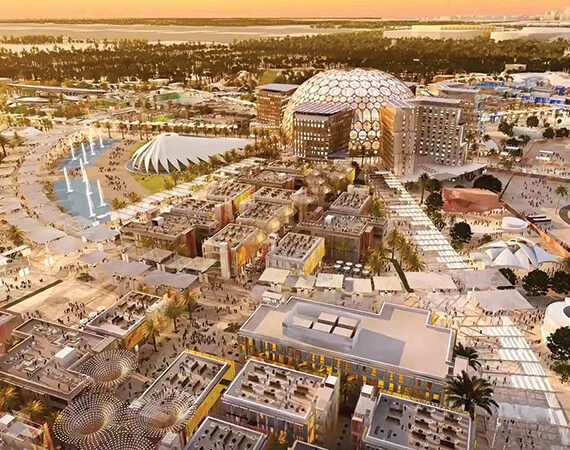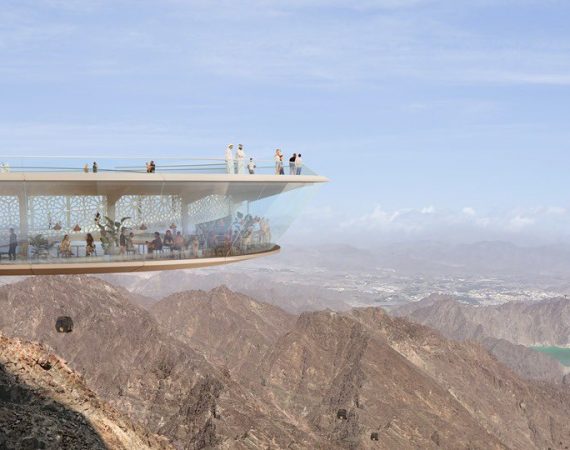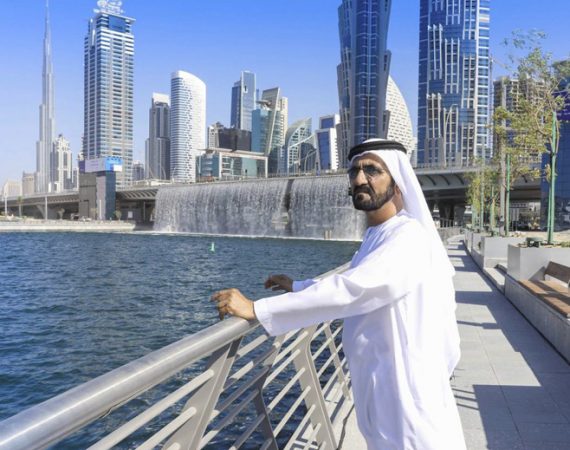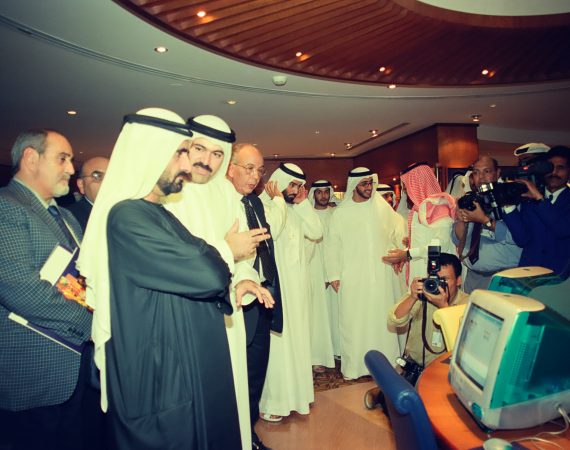What are the UAE Future Foresight Initiatives?
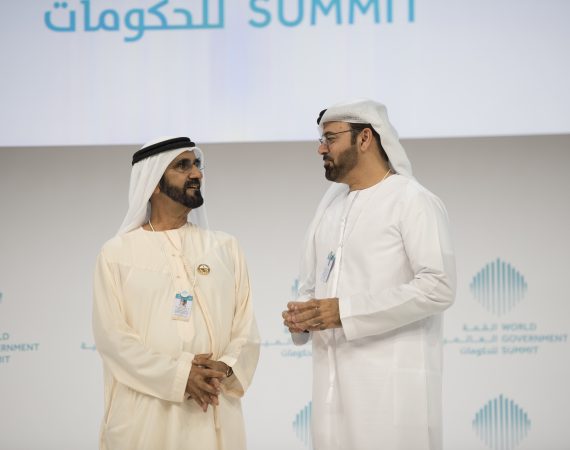
The UAE has a long tradition of looking to the future to better people’s lives.
Holding a bamboo stick… Zayed was writing in the sand… He was writing a future that no one could have ever envisioned… He was designing a country that no one would have known about without that piercing vision toward the future… It was said that he was “visualizing”. He was writing whatever comes to his mind, according to one of his advisors who accompanied him, called “John”, it is not with a pen, but with a bamboo stick… it accompanied him wherever he had gone and travelled… and he transcribed the sand projects, parks, hospitals and green oasis that will transport the UAE in a very short period of time to a present that does not resemble its history… and a future that is closer to imagination just because he ” envisaged”.
The creation of the future has become a legacy as well as a solid method for the UAE’s leadership. When His Highness Sheikh Mohammed bin Rashid Al Maktoum assumed his position as the Prime Minister of the UAE in 2006, a new era in government administration, industry and design commenced and continued. As a result, the UAE has become an inspirational model for the region and the world in just a few years.
Between the past and the present… the UAE consistently takes first place over the major players in every initiative it launches… This is because its leadership craves first place… and its people are only happy with only first place… So this idea takes root in action and application in the hearts of its youngsters… and here comes the Emirates on its way to Mars. With its bright youth, which portrays the history of a young country whose achievements predate its age and the age of countries that have exceeded it in power, history, and influence. The UAE model, which was first questioned for its success and application, has evolved into a model that can be exported today, as proven by government development agreements between the UAE government and 20 countries around the world.
Sheikh Mohammed bin Rashid Al Maktoum, Vice President and Prime Minister of the UAE and Ruler of Dubai, believes that “the future belongs to those who can envision, plan, and implement it.”
The future does not wait; the future can be created and built today
Under the direction of His Highness Sheikh Mohammed bin Rashid Al Maktoum, the UAE government launched several programs and formed several institutions to define the future and enhance the quality of life of communities worldwide. Since 2006, His Highness commissioned Mohammad Al Gerawi, the UAE Minister of Cabinet Affairs, with overseeing initiatives and projects about the future, and from 2016 until July 2020, Al Gergawi was in charge of the future portfolio as part of his ministerial duties.
Here are 11 government initiatives in the realm of foreseeing the future.
UAE Vision 2021 and the Centennial of the UAE
The UAE government has released a number of federal national visions and plans that create a clear road map to achieve a number of goals in a group of critical sectors in order to attain leadership and global competition, based on the leadership’s approach of planning and preparing for the future.
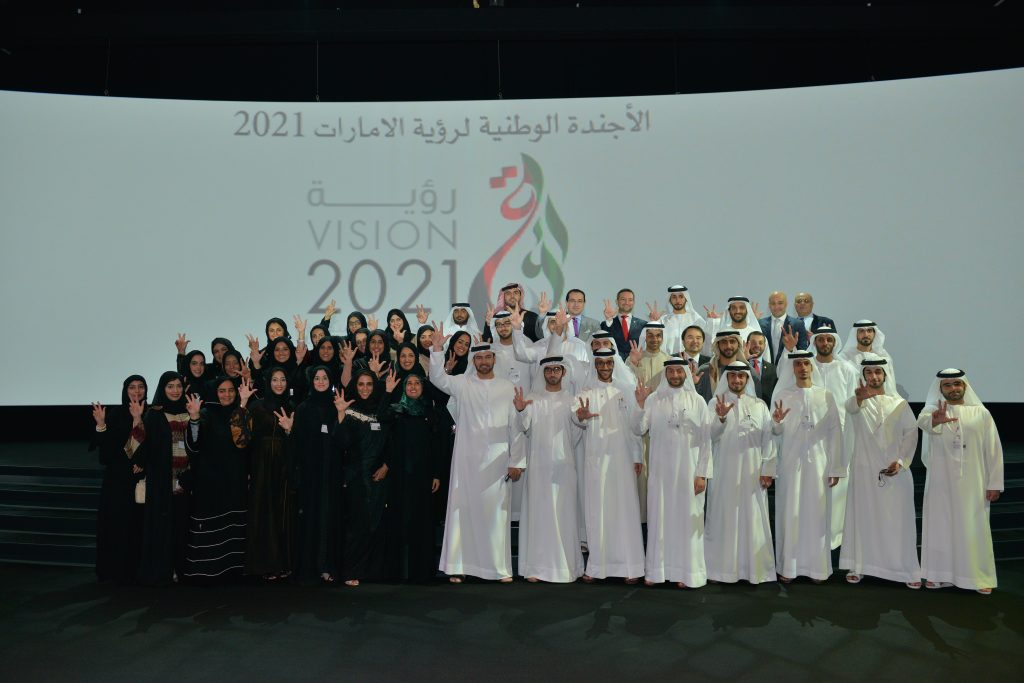
Mohammad AlGergawi and Ohood Al-Roumi in a group photo with the National Agenda team for UAE Vision 2021
His Highness Sheikh Mohammed bin Rashid Al Maktoum, Vice President and Prime Minister of the UAE and Ruler of Dubai unveiled the UAE Vision 2021 during a Ministerial Retreat in 2010, to make the UAE one of the greatest countries in the world by its Golden Jubilee in 2021. The seven-year National Agenda was launched in 2014 to guide efforts toward realizing the UAE Vision 2021. More than 300 officials from 90 federal and local government departments, as well as civil society groups, the private sector, and specialists from academic and research institutions, participated in a series of events to create the agenda.
His Highness launched the UAE Centennial 2071 at the Cabinet meeting in 2017, which includes a comprehensive and long-term vision spanning five decades to make the UAE the best country in the world by the 100th anniversary of its foundation. It aims to form a clear map for long-term government action to enhance the country’s reputation and soft power. The centennial was divided into five deciles, with goals and strategies changing every ten years and periodic assessments.
Anticipating the Future: Smart Government
To build on His Highness’s e-government project, the first of its kind in the region and to keep up with the Internet era, Sheikh Mohammed bin Rashid Al Maktoum launched the Smart Government program in 2013 aimed at offering services to the people wherever they are and around the clock through a mobile device, within the framework of directives. In accordance with the UAE Vision 2021, the government seeks to grow government services and improve and accelerate the customer journey in order to attain the well-being and happiness of UAE residents.
The UAE government’s investment in technology and sophisticated digital infrastructure 20 years ago proved fruitful during the Covid-19 virus’s general shutdown period, as education and remote work proceeded smoothly.
World Government Summit
The World Government Summit (WGS) was founded in 2013 by His Highness Sheikh Mohammed bin Rashid Al Maktoum with the objective of building the future generation of governments in order to make their people happy, whom the World Government Summit’s Chairman Mohammad Al Gergawi refers to as “customers.” WGS also aims to improve the quality of services provided to them, anticipate the future, monitor challenges, and formulate policies for development and progress. At the time, it was called the “Government Summit.”
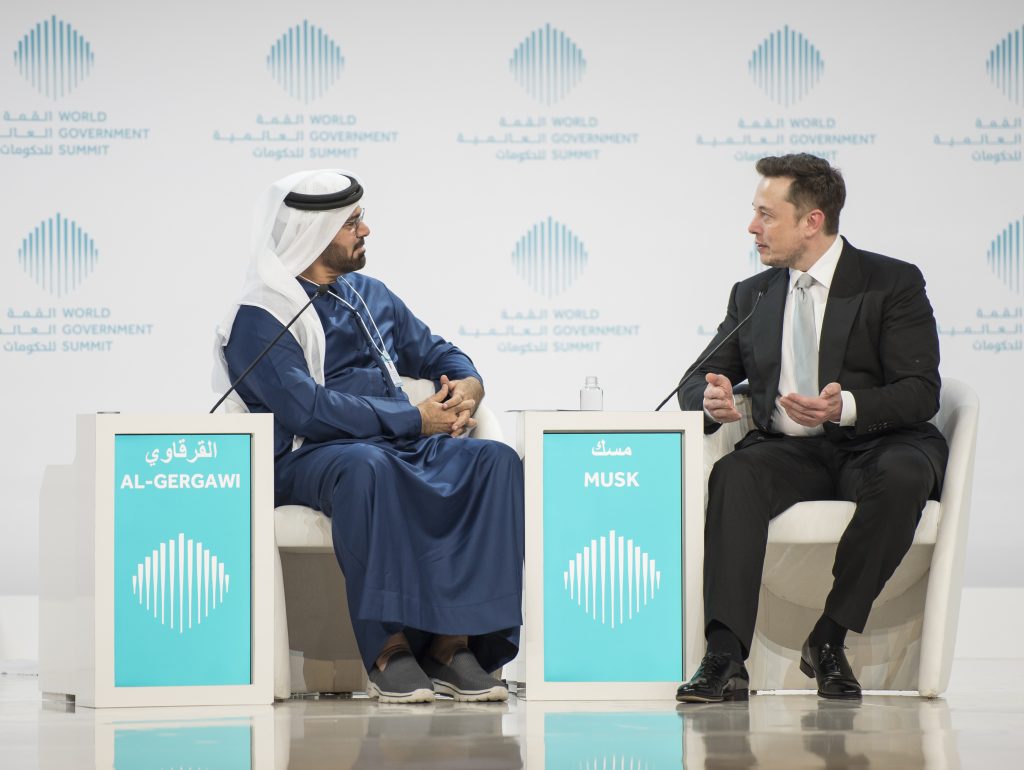
Elon Musk’s keynote session at the 2017 World Government Summit, moderated by Mohammad Al Gergawi
In 2016, His Highness directed to transform the summit from a global event into a global institution that operates throughout the year and focuses on foreseeing the future in all industries. This is done in collaboration with the most significant international organizations, including the United Nations, the Gulf Cooperation Council and the Arab League, the World Bank, the International Monetary Fund and the World Economic Forum.
The World Government Summit has grown to become the largest annual global government event and an international forum for governments across the world to discuss and exchange ideas. Since its establishment in 2013, it has welcomed over 25,000 participants, 1000 experts, 140 nations and over 1000 sessions and forums.
Dubai Future Foundation
The Ruler of Dubai founded the Dubai Future Foundation in 2016 as an independent research endowment organization to monitor the execution of the Dubai Future Agenda, with the goal of foreseeing the medium and long-term future of important industries. All in collaboration with several public and private sector agencies and entities.
A variety of projects aiming at foreseeing the future with technology at its heart were launched under the umbrella of the Dubai Future Foundation, including The Museum of the Future, Dubai Future Accelerators, the Emirates Center for the Fourth Industrial Revolution, the 3D printing strategy, the UAE Drones for Good Award, The UAE AI & Robotics Award for Good , the Dubai Future Council for Blockchain, part of the “Dubai Future Councils” initiative, and the Dubai Future Academy, which launched the Dubai Future Experts Program.
Ministerial Formations
The UAE government has crossed into the future due to its flexibility and efficiency in meeting national goals, investing in Emirati cadres, and thinking forwards.
His Highness Sheikh Mohammed bin Rashid Al Maktoum announced a significant cabinet reshuffle on July 5, 2020, in keeping with the worldwide developments brought about by the Covid-19 epidemic. New ministerial portfolios were established to bolster the UAE’s strides toward the knowledge and digital economy that would prevail in the post-Coronavirus age.
The position of Minister of State for Digital Economy, AI, and Remote Work Applications was established. In response to the problems created by the rise of the digital economy and the related cybersecurity concerns, the UAE government formed a Ministry of Industry and Advanced Technology, named a head of the digital government, and appointed a head of cybersecurity.
After this pandemic showed the potential of interruption to supply chains from abroad, the UAE leadership confirmed that food security will remain a priority through two ministers: the Minister of State for Food Security and the Minister of Environment. In October 2017, Sheikh Mohammed announced the appointment of a Minister of State for Artificial Intelligence, a Minister of State for Advanced Sciences and a Minister of State for Food Security. However, when the Covid-19 virus broke out and countries’ borders were closed, disrupting source and supply chains globally, the UAE’s forward-thinking approach to food security proved more important than ever, as the UAE was able to efficiently secure the needs of its people and other nations as well.
The UAE’s Future Foresight Strategy
The Ministry of Cabinet Affairs was tasked with anticipating the future in the UAE’s new Cabinet reshuffle for 2016, and the future portfolio was added to Mohammad Al Gergaw’s ministerial responsibilities, and Sheikh Mohammed directed him with developing a national plan to guarantee that the government and all sectors are keeping up with future developments.
The UAE Future Foresight Strategy was launched in September 2016 to anticipate and analyze opportunities and challenges in all vital sectors of the country and develop long-term proactive plans for them at all levels to achieve qualitative achievements that serve the country’s interests.
Global Future Councils
Since 2016, the UAE government, in cooperation with the World Economic Forum “Davos”, has organized the activities of the “Global Future Councils”, which consists of 50 specialized councils to predict the future of the world in a variety of development, scientific, economic, and political sectors, with the participation of 700 specialists and experts. The councils began in 2008 as “Global Agenda Councils,” and in the 2016 cycle, they evolved into “Global Future Councils,” contributing to the World Economic Forum’s qualitative leap to become a global forum for the dissemination of knowledge and the development of innovative solutions to future challenges.
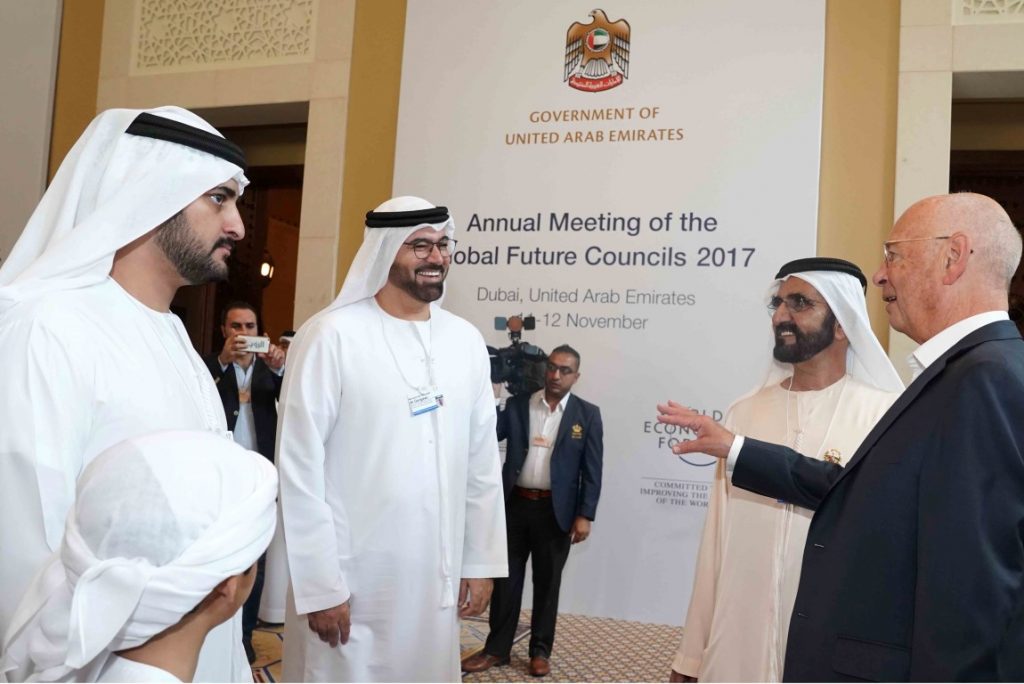
The Global Future Councils of Dubai help to define and establish the agenda for the upcoming Davos summit, which comprises 2,000 of the most influential global leaders. The Global Future Councils address the Fourth Industrial Revolution and anticipate its future in the context of developing solutions to address its diverse challenges, as well as keeping pace with expected changes at multiple levels, such as technological advancements in vital sectors of innovation such as energy, transportation, infrastructure, and artificial intelligence.
Space Exploration
Sheikh Zayed bin Sultan Al Nahyan had ambitious goals for the space industry, and he realized in the 1970s that the UAE was capable of leaving its mark not just on the ground but also in the sky. Zayed took the initial moves in this sector on November 8, 1975, when he launched a satellite communication ground station in the Jebel Ali district of Dubai.
In the UAE’s development journey, the leadership has placed great importance on the space sector, resulting in initiatives such as the National Space Program, which was launched in 2017 with the goal of developing Emirati cadres specialized in space sciences and contributing to humanity’s journey into space. The initiative involves training Emirati astronauts and a 100-year plan to develop the first human community on Mars by 2117, and to launch the UAE Hope Probe to Mars in 2021, coinciding with the UAE’s 50th anniversary.
The UAE government announced the National Space Strategy 2030 in March 2019, which serves as a national reference for the key efforts of the relevant agencies and organizations functioning in the space sector. The UAE Space Agency is in charge of monitoring strategy implementation in collaboration with strategic partners.
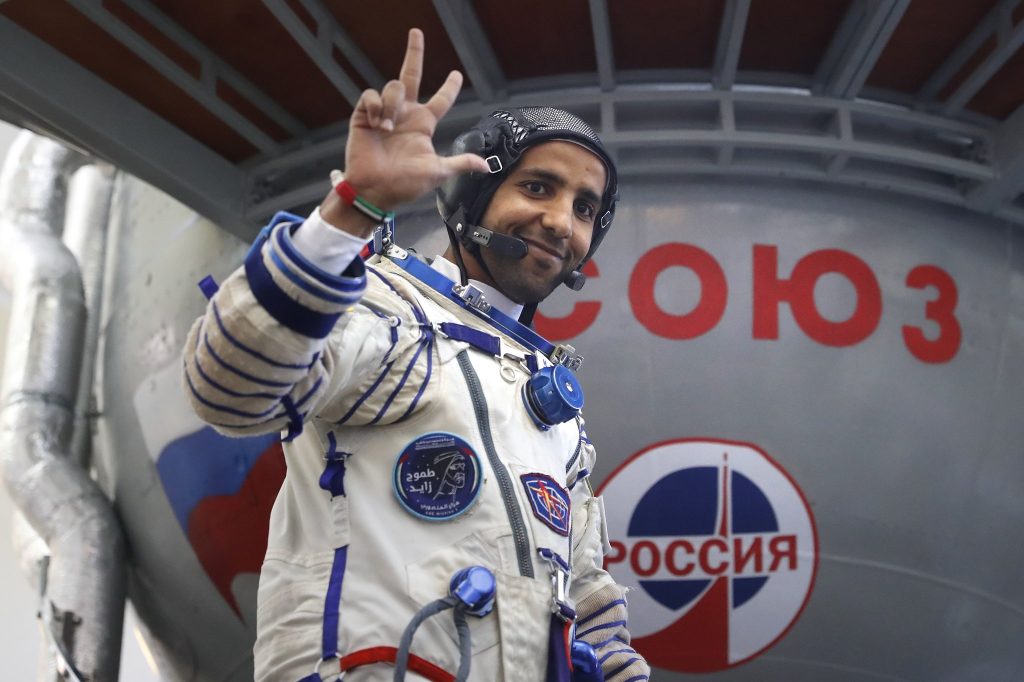
After 50 years, Zayed’s dream was accomplished with the arrival of Hazza Al Mansouri, the first Emirati astronaut to the International Space Station in September 2019, and the successful arrival of the UAE Hope Probe to Mars in July 2021.
Government Design Initiative
The UAE’s founders were designers, and the country was created on design principles. Based on this notion, the UAE government launched the “Government Design” program in 2019, the first of its kind at the governmental level. That represents a new methodology in government work that adopts design-thinking principles, focusing on society’s aspirations and the needs of its members, as well as promoting design culture in developing and launching initiatives, policies, and programs that focus on the human being and activating social and economic roles, in order to achieve the goals of the “UAE Centennial 2071.”
The initiative provides a training program to graduate Chief Executives of Government Design in each ministry, to bring about change in government work approaches.
Foreseeing the Future of Renewable Energy
The UAE was one of the first countries in the region to identify renewable energy as a crucial pillar of the future and one of the UAE’s strategic goals as it prepares to say goodbye to the final barrel of oil in 2050.
The Barakah Nuclear Energy Plant project, which is being developed by the Nawah Energy Company of the Emirates Nuclear Energy Corporation, is one of the most important initiatives in this direction. Its first peaceful reactor was successfully operated on August 1, 2020, allowing the UAE to join the nuclear club, where the project would provide 25% of the country’s needs once all four facilities are operational. It will help to reduce carbon dioxide emissions by the equivalent of eliminating 3.2 million cars from the road.
Barakah Nuclear Energy Plant
His Highness Sheikh Mohammed bin Rashid Al Maktoum established the “Mohammed bin Rashid Al Maktoum Solar Energy Complex” project in 2012, with a 12-billion-dirham investment. The facility is thought to be the largest of its sort in the Gulf region, with a capacity of 1,000 megawatts by 2030. The fourth phase of the complex is planned to be the world’s largest energy storage facility for a period of 15 hours, allowing clean energy to be available around the clock for about 320,000 homes while reducing 1.6 million tons of carbon emissions yearly.
